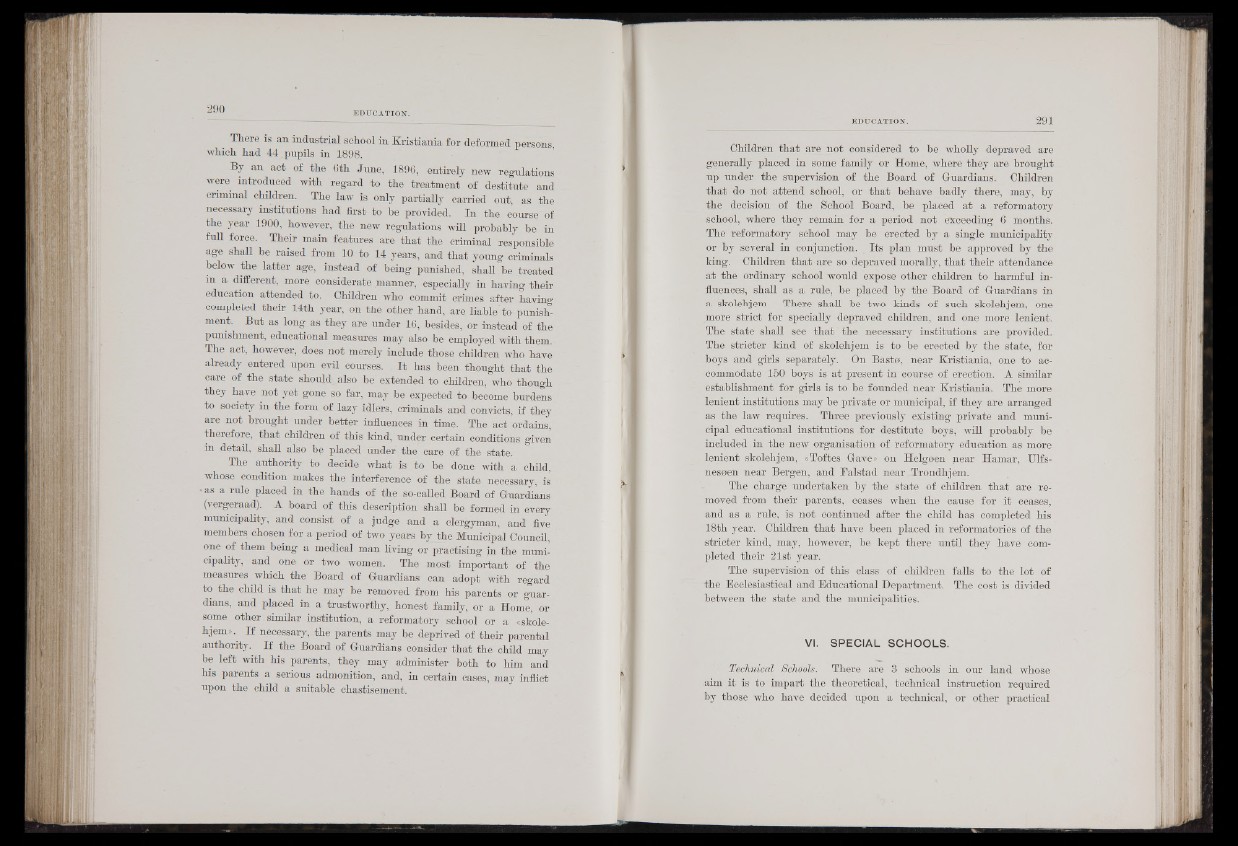
There is an industrial school in Kristiania for deformed persons
which had 44 pupils in 1898.
By an act of the 6th June, 1896, entirely new regulations
were introduced with regard to the treatment of destitute and
criminal children. The law is only partially carried out, as the
necessary institutions had first to be provided. In the course of
the year 1900, however, the new regulations will probably be in
fuU force. Their main features are that the criminal responsible
age shall be raised from 10 to 14 years, and that young criminals
below the latter age, instead of being punished, shall be treated
in a different, more considerate manner, especially in having their
education attended to. Children who commit crimes after having
completed their 14th year, on the other hand, are liable'to punishment.
But as long as they are under 16, besides, or instead of the
punishment, educational measures may also be employed with them.
The act, however, does not merely include those children who have
already entered upon evil courses. I t has been thought that the
care of the state should, also be extended to children, who though
they have not yet gone so far, may be expected to become burdens
to society in the form of lazy idlers, criminals and convicts, if they
are not brought under better influences in time. The act ordains,
■therefore, that children of this kind, under certain conditions given
m detail, shall also be placed under the care of the state.
The authority to decide what is to be done with a child,
whose condition mates the interference of the state necessary, is
•as a rule placed in the hands of the so-called Board of Guardians
(vergeraad). A board of this description shall be formed in every
municipality, and consist of a judge and a clergyman, and five
members chosen for a period of two years by the Municipal Council,
one of them being a medical man living or practising in the municipality,
and one or two women. The most important of the
measures which the Board of Guardians can adopt with regard
to the child is that he may be removed from his parents or guardians,
and placed in a trustworthy, honest family, or a Home, or
some other similar institution, a reformatory school or a « skolehjem
».^ If necessary, the parents may be deprived of their parental
authority. If the Board of Guardians consider that the child may
be left with his parents, they may administer both to him and
his parents a serious admonition, and, in certain cases, may inflict
upon the child a suitable chastisement.
Children that are not considered to be wholly depraved are
generally placed in some family or Home, where they are brought
up under the supervision of the Board of Guardians. Children
that do not attend school, or that behave badly there, may, by
the decision of the School Board, be placed at a reformatory
school, where they remain for a period not exceeding 6 months.
The reformatory school may be erected by a single municipality
or by several in conjunction. Its plan must be approved by the
king. Children that are so depraved morally, that their attendance
at the ordinary school would expose other children to harmful influences,
shall as a rule, be placed by the Board of Guardians in
a skolehjem. There shall be two kinds of such skolehjem, one
more strict for specially depraved children, and one more lenient.
The state shall see that the necessary institutions are provided.
The stricter kind of skolehjem is to be erected by the state, for
boys and girls separately. On Basto, near Kristiania, one to accommodate
150 boys is at present in course of erection. A similar
establishment for girls is to be founded near Kristiania. The more
lenient institutions may be private or municipal, if they are arranged
as the law requires. Three previously existing private and municipal
educational institutions for destitute boys, will probably be
included in the new organisation of reformatory education as more
lenient skolehjem, «Toftes Gave» on Helgoen near Jlamar, Ulfs-
nesoen near Bergen, and Ealstad near .Trondhjem.
The charge undertaken by the state of children that are removed
from their parents, ceases when the cause for it ceases,
and as a rule, is not continued after the child has completed his
18th year. Children that have been placed in reformatories of the
stricter kind, may, however, be kept there until they have completed
their 21st year.
The supervision of this class of children falls to the lot of
the Ecclesiastical and Educational Department. The cost is divided
between the state and the municipalities.
VI. SPECIAL SCHOOLS.
Technical Schools. There are 3 schools in our land whose
aim it is to impart the theoretical, technical instruction required
by those who have decided upon a technical, or other practical